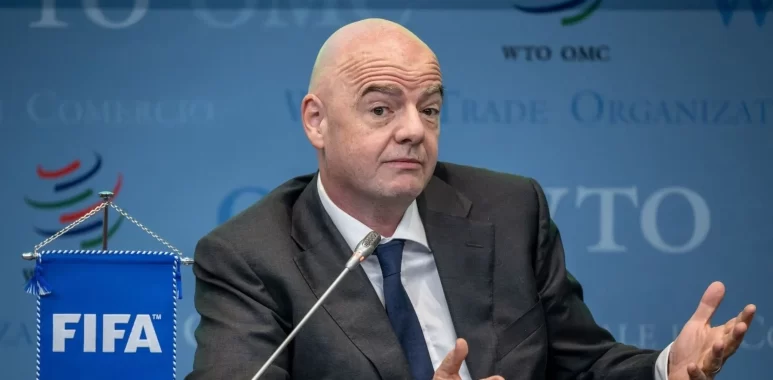
FIFA President Gianni Infantino Rejects Blue Cards Proposal
FIFA president Gianni Infantino has firmly opposed the incorporation of blue cards into football, denouncing the possibility of their implementation in the forthcoming sin bin experiment.
Blue cards, poised to signal a player’s temporary dismissal in the sin bin trial protocols, encountered substantial backlash upon their announcement on February 8.
This prompted the IFAB to suspend their release pending further discussions at the organization’s annual general meeting.
In a bold statement preceding the weekend’s gathering in Loch Lomond, Infantino asserted, “There will be no utilization of blue cards at the elite level. This subject holds no relevance for us. FIFA staunchly opposes blue cards. I was not previously acquainted with this matter. As the president of FIFA, I believe FIFA holds sway within the IFAB. Therefore, whether you desire the title, ‘It’s a red card for the blue card’!”
Infantino’s opposition stems from a commitment to uphold the integrity, tradition, and essence of the game. He perceives the introduction of blue cards as a departure from these foundational principles, asserting that upon closer examination, they have no place in football.
The introduction of blue cards would mark a significant departure in player disciplinary management, rivaled only by the introduction of red and yellow cards at the 1970 World Cup. However, Infantino’s rejection indicates a staunch adherence to preserving the existing framework of disciplinary measures.
Despite the setback regarding blue cards, the sin bin trial is expected to undergo further development, albeit at a lower footballing level than initially proposed. The Football Association had expressed interest in conducting trials in the men’s and women’s FA Cups, signaling potential future experimentation.
Discussions at the AGM will also address alternative signals and trials, including replacements for the blue card and considerations regarding tactical fouls and dissent. Initiatives such as ‘captain-only zones’ and cooling off periods during mass confrontations aim to enhance player conduct across all levels of the game.
Another focal point of discussion revolves around the trial concerning goalkeeper handling rules, prompted by concerns regarding the enforcement of the current six-second rule. Additionally, management of head injuries, including petitions for temporary concussion substitutes, underscores FIFA’s commitment to player welfare.
In reaffirming FIFA’s stance on player welfare, Infantino emphasized the prioritization of health and safety, particularly regarding concussion management. While trials for permanent concussion substitutes have received initial approval, FIFA remains steadfast in its commitment to ensuring player well-being.
In conclusion, FIFA’s rejection of blue cards underscores its dedication to preserving the integrity and tradition of the game while prioritizing player welfare. As discussions continue at the AGM, the focus remains on enhancing player conduct and safety to set a positive example for future generations.

